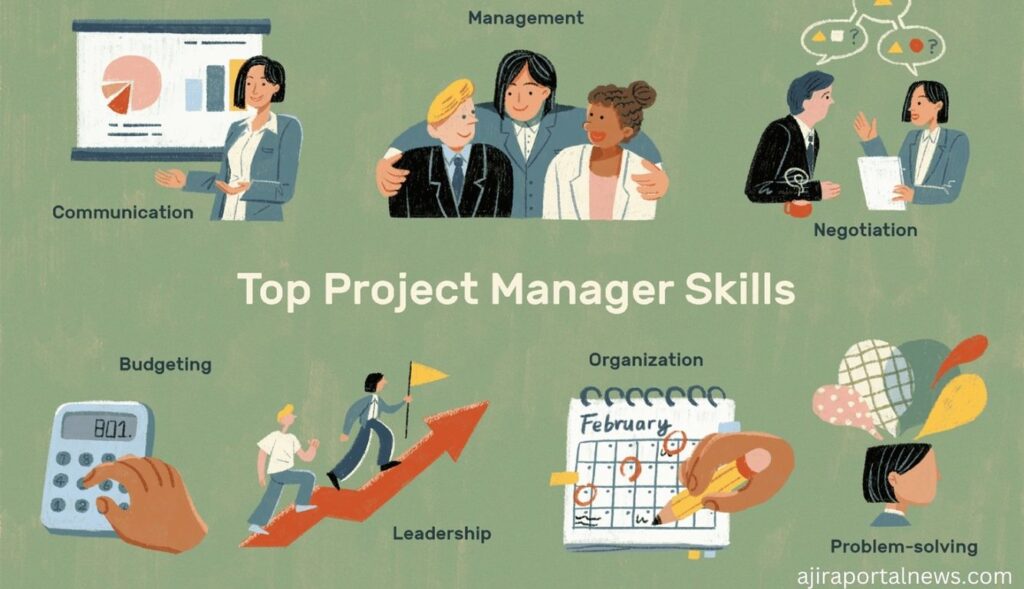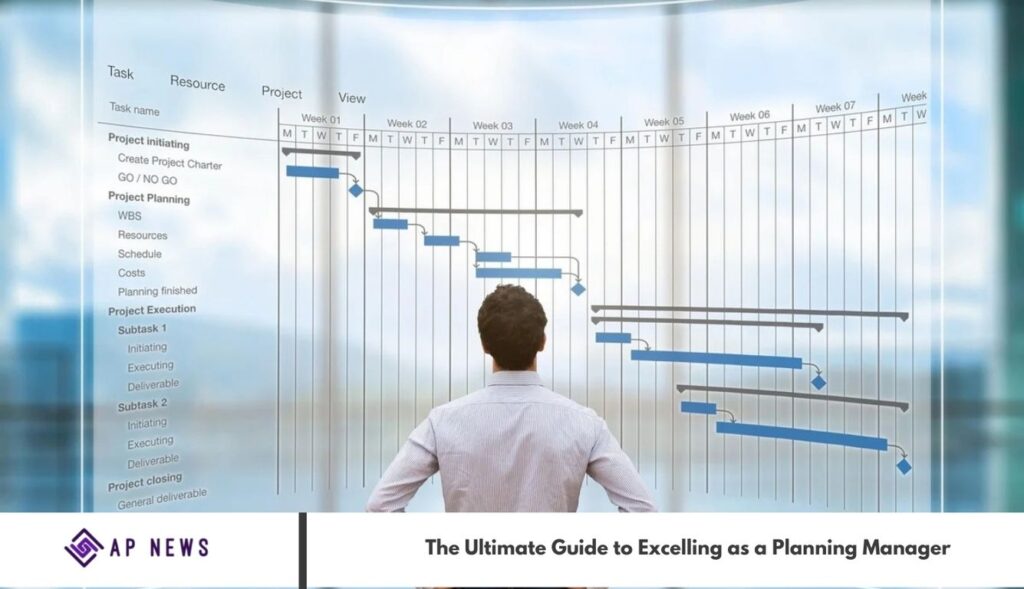A planning manager plays a pivotal role in driving organizational success by ensuring projects are completed efficiently, and objectives are met. With responsibilities ranging from strategic scheduling to resource allocation, excelling in this role requires a blend of analytical skills, leadership, and adaptability. Whether you’re new to the field or looking to elevate your expertise, mastering the art of planning management can significantly enhance your career prospects.
This guide provides valuable insights and actionable tips to help you thrive as a planning manager. From understanding core responsibilities to adopting advanced tools and strategies, we’ll explore everything you need to become a reliable and effective leader in project planning. Let’s dive into the essentials that can empower you to excel in this dynamic and rewarding profession.
What is a Planning Manager?
A Planning Manager is a professional responsible for developing and managing plans to ensure the successful execution of projects, operations, or organizational goals. They play a critical role in coordinating resources, setting priorities, and establishing timelines to align with the company’s objectives. Planning Managers work across various industries, including construction, manufacturing, logistics, and corporate management.
Their primary focus is on strategic thinking and problem-solving, enabling them to anticipate potential challenges and implement efficient solutions. By analyzing data, collaborating with teams, and leveraging planning tools, a Planning Manager ensures that tasks are completed on time, within budget, and to the desired quality standards.
What does a Planning Manager do?
A Planning Manager is responsible for overseeing and coordinating the planning processes within an organization to ensure projects and operations run smoothly and efficiently. They develop strategies, set timelines, allocate resources, and monitor progress to achieve organizational goals. Their role often involves working closely with various departments to align objectives, streamline workflows, and mitigate risks.
Key duties include analyzing data to forecast future needs, creating detailed schedules, managing budgets, and ensuring compliance with organizational standards and policies. A Planning Manager also plays a crucial role in problem-solving, using their expertise to address challenges and implement solutions that optimize performance and drive success.
Setting Objectives
A planning manager plays a critical role in defining clear goals and objectives before a project begins. These objectives serve as a roadmap for project execution and are invaluable during evaluations. Additionally, the organization often expects the planning manager to successfully achieve all outlined objectives by the project’s completion.
Key Responsibilities of a Planning Manager
Strategic Planning and Scheduling
Planning Managers develop comprehensive schedules and timelines for projects or operations. They identify key milestones, allocate resources, and ensure that every team understands their roles and deadlines.
Resource Allocation
One of the critical aspects of this role is managing resources effectively, including personnel, budget, and equipment. Ensuring optimal resource utilization without overburdening the team is essential.
Data Analysis and Forecasting
Planning Managers analyze data to predict future needs, identify risks, and develop contingency plans. They use this information to inform decision-making and maintain project momentum.
Facilitating Communication Between the Project Team and Clients
Effective corporate communication is vital for the smooth operation of any business. A planning manager plays a key role in maintaining clear and consistent communication between clients and the project team. This involves conveying the needs and expectations of both parties through staff meetings, phone calls, or emails, ensuring alignment and collaboration.
Monitoring and Reporting
Monitoring and reporting are essential responsibilities for a Planning Manager, ensuring that projects stay on track and align with organizational goals. By regularly tracking progress, identifying potential issues, and analyzing key performance metrics, a Planning Manager can make informed adjustments. Effective reporting provides transparency to stakeholders, facilitates decision-making, and ensures that plans are being executed efficiently and successfully.
Skills Needed to Succeed as a Planning Manager

Analytical Thinking
Analytical thinking is essential for a Planning Manager to evaluate complex situations, interpret data, and make informed decisions. By breaking down challenges into manageable parts, they can identify patterns, anticipate risks, and develop effective solutions, enabling smooth project execution and enhanced organizational performance.
Leadership and Decision-Making
Leadership and decision-making are crucial for a Planning Manager, as they involve guiding teams, setting clear goals, and making informed choices that align with organizational objectives. Effective leadership fosters collaboration, while strong decision-making ensures timely, data-driven actions that address challenges and opportunities, ultimately driving success and adaptability in planning processes.
Technical Proficiency
Technical proficiency is essential for a Planning Manager, as it involves mastering tools and software for data analysis, project management, and forecasting. A strong understanding of these technologies allows for efficient planning, accurate decision-making, and the ability to adapt to evolving industry trends. Technical skills ensure that planning processes are streamlined, measurable, and aligned with strategic goals.
Communication Skills
Communication skills are vital for a Planning Manager, as they ensure clear and effective interaction with team members, stakeholders, and senior management. Strong communication helps convey ideas, expectations, and updates efficiently, fostering collaboration and alignment. It also involves active listening, providing constructive feedback, and adapting messages to suit different audiences, enhancing decision-making and team performance.
Adaptability
Adaptability is a key trait for a Planning Manager, as it enables the ability to respond quickly and effectively to changing circumstances, market trends, or unexpected challenges. Being adaptable ensures that planning strategies remain relevant and flexible, allowing for continuous improvement and innovative solutions. This skill helps maintain productivity and alignment with organizational goals, even in dynamic environments.
You may also like it:
Corporate Manager at WASSHA Incorporation Tanzania
Tips for Excelling as a Planning Manager
Understand Your Industry
Understanding your industry is essential for a Planning Manager, as it provides the context needed to make informed decisions and craft effective strategies. By staying updated on industry trends, challenges, and competitive landscapes, a Planning Manager can anticipate changes, identify opportunities, and align planning efforts with market demands. This knowledge ensures that decisions are relevant and timely and contribute to the long-term success of the organization.
Leverage Technology
Leveraging technology is crucial for a Planning Manager to streamline processes, enhance decision-making, and improve overall efficiency. By utilizing advanced tools for data analysis, project management, and forecasting, a Planning Manager can gain valuable insights, automate repetitive tasks, and make more informed, timely decisions. Embracing the latest technologies helps optimize resources, improve accuracy, and maintain a competitive edge in a fast-paced business environment.
Foster Team Collaboration
Fostering team collaboration is essential for a Planning Manager, as it promotes a culture of open communication, trust, and shared goals. By encouraging teamwork, providing clear direction, and recognizing individual contributions, a Planning Manager ensures that team members work together efficiently to achieve common objectives. Collaborative environments enhance problem-solving, boost creativity, and lead to more successful planning outcomes, ultimately driving the organization forward.
Focus on Continuous Improvement
Focusing on continuous improvement is vital for a Planning Manager, as it drives ongoing refinement of processes, strategies, and team performance. By regularly evaluating outcomes, seeking feedback, and identifying areas for growth, a Planning Manager fosters a culture of learning and adaptation. This commitment to improvement ensures that planning efforts remain effective, efficient, and aligned with evolving organizational goals, leading to sustained success.
Stay Organized and Proactive
Staying organized and proactive is crucial for a Planning Manager to effectively manage multiple projects, deadlines, and resources. By maintaining clear systems for tracking tasks, prioritizing goals, and anticipating challenges, a Planning Manager ensures smooth execution and minimizes risks. Proactive planning enables quick adjustments when necessary, helping the team stay on track and meet objectives efficiently. This approach fosters better decision-making and long-term success.
Average Salary of a Planning Manager
The average salary for a Planning Manager in France varies based on factors such as location, industry, and experience. In Paris, the average salary is approximately €58,000 per year, with total compensation reaching around €66,900 annually. In Franconville, the average salary is higher, at €87,031 per year. Overall, Planning Managers in France can expect to earn between €50,710 and €84,354 annually, depending on their specific role and location.
Frequently Asked Questions
What is the role of a Planning Manager?
A Planning Manager is responsible for overseeing the planning and coordination of various projects and operations within an organization. This includes setting goals, allocating resources, managing schedules, and ensuring that plans align with the organization’s strategic objectives.
What skills are required to be a successful Planning Manager?
Key skills include strong leadership, communication, problem-solving, technical proficiency with planning software, adaptability, and the ability to make data-driven decisions. A good Planning Manager also needs to foster team collaboration and focus on continuous improvement.
What tools do Planning Managers use?
Planning Managers use project management tools like Microsoft Project, Trello, or Asana, data analysis software like Excel or Tableau, and forecasting tools to manage schedules, track progress, and make informed decisions.
How does a Planning Manager make decisions?
A planning manager makes decisions based on data analysis, industry trends, and feedback from team members and aligns them with organizational goals. They must consider both short-term and long-term impacts when making decisions.
How do Planning Managers handle challenges?
Planning Managers address challenges by staying proactive, adjusting plans when necessary, utilizing problem-solving techniques, and ensuring open communication with teams and stakeholders to find the best solutions.
How can I improve my career as a Planning Manager?
Continuous learning, adapting to new technologies, networking within your industry, and focusing on leadership and communication skills are great ways to improve your career. Seeking feedback and identifying areas for personal development can also help you advance.
What is the typical salary of a Planning Manager?
Salaries vary depending on location, experience, and industry. On average, a Planning Manager earns between $60,000 and $90,000 annually in many regions, though this can vary.
What industries employ Planning Managers?
Planning Managers are employed in a variety of industries, including manufacturing, construction, logistics, retail, and technology, among others, where efficient planning and resource allocation are critical to success.
Conclusion
Excelling as a Planning Manager requires a blend of technical expertise, leadership, and adaptability. By understanding your role, honing essential skills, and applying proven strategies, you can become an invaluable asset to your organization. With the right approach, this career path offers immense potential for professional growth and the satisfaction of driving success at every level.
Start your journey toward mastering planning management today and unlock new opportunities for achievement!

